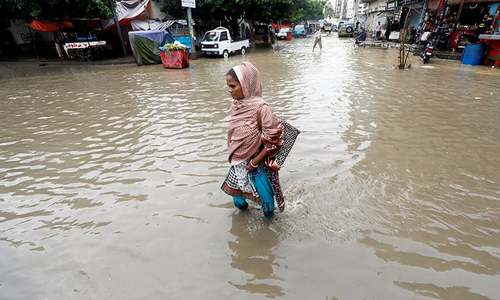Although authorities in Karachi were seen engaged in de-watering and removing waste material of sacrificial animals as the nation observed the second day of Eidul Azha on Tuesday, the city was far from relieved of the immense difficulties faced over the past few days.
Piles of offal were seen lying on the roads in several areas, some localities were still submerged in rain-accumulated water and sewerage and in certain areas the electricity remained suspended for a third consecutive day, according to officials and residents.
The institutional response appeared to be slow as foul odours emanating from the waste of sacrificial animals continued to cause immense inconveniences to the citizens.
A visit to different areas and talking to the residents there revealed that a vast amount of offals were still lying in an open ground on main University Road in Gulshan-i-Iqbal near Federal Urdu University whereas rainwater was still accumulated at NIPA intersection.
Similarly, a part of Dr Ziauddin Ahmed Road was submerged in rainwater, prompting the authorities to divert traffic to a single lane of the road.
Not only had low-lying areas suffered but accumulated rainwater was still present in some parts of the centre of the city, Saddar.
Particularly, the outskirts of the city near Malir Nadi (river) and Lyari Nadi (river) pass were still submerged, forcing hundreds of residents to vacate their homes and shift to their relatives’ or other places.
Javed Afridi, a resident of Quaidabad area told Dawn that Shah Latif Town, Khuldabad, Aga Town, Gulshan-i-Abbas, Raza City, Haider City and other localities off National Highway were severely inundated with rainwater when ‘Sukhan Nadi’ overflowed due to heavy rains on Sunday.
He said that the Army and Edhi’s boats had rescued people from their homes.
The residents believed that an estimated 400-500 homes in Union Council-6 of Khuldabad were vacated to save the people’s lives. He said that since the last three days, electricity had not been restored in the said areas due to flooding.
One lane of Jamshed Road from Central Prison up to the area near Guru Mandir was also flooded with rainwater and sewerage.
Parts of Lyari, too, were still inundated with rainwater and sewerage.
Residents of Agra Taj Colony protested and allegedly attacked DMC South Chairman Malik Fayaz, resulting in injury to two persons.
Meanwhile, the chief minister’s spokesperson said that accumulated rainwater was drained out from Madras Society off Superhighway while rainwater would be drained from Yusuf Goth of Surjani Town by Tuesday night.
The spokesperson added that Local Government Secretary Khalid Hyder Shah had also informed the chief minister that offal and other post-sacrificial wastage was being taken away from various parts of the city.
Sindh Solid Waste Management Board spokesperson in a statement said that so far 29,257 tonnes of offal had been taken away from different parts of the city on the first and second day of Eid which were buried at different places while insecticidal spraying was also carried out to prevent diseases.
'All necessary precautionary measures taken'
Sindh Minister for Information Saeed Ghani claimed that as a result of the adaptation of “all the necessary precautionary measures,” the people of Karachi did not suffer much during the recent spell of heavy rains in the metropolis.
Ghani said that prior to the expected heavy rains, all the members of the Sindh cabinet by mobilising every available resource with the Karachi Municipal Corporation and other local government institutions made sure that the rain did not cause havoc for the people of Karachi and Hyderabad.
“Their determination and untiring efforts paid off,” he added.
The minister admitted that the residents of low-lying areas suffered due to the accumulation of water but claimed that soon after the rain, the water from these areas had also been drained out.
“By utilising hundreds of water pumps, the rainwater had been drained out from almost all the affected areas of the metropolis.”
He pointed out that Karachi scarcely experienced heavy showers of this magnitude during the monsoon season which was why the administration faced "a bit of difficulty” while tackling the situation.
The minister said that because of the overflowing of the Malir and Lyari drains, Korangi and EBM causeways had been temporarily closed but now both of these had been opened for traffic after the drainage of water.
He also said that the disposal of the wastage of the sacrificial animals was also in full swing.
The minister said that it was “extremely regrettable” that even after so many deaths in Karachi, no action has yet been initiated by the federal government against K-Electric.
Similarly, nothing has been done so far against the administration of Hyderabad Electric Supply Company and Sukkur Electric Supply Company, he added.
He advised the mayor of Karachi to “concentrate on his responsibilities” rather than focusing on taking credit.














































